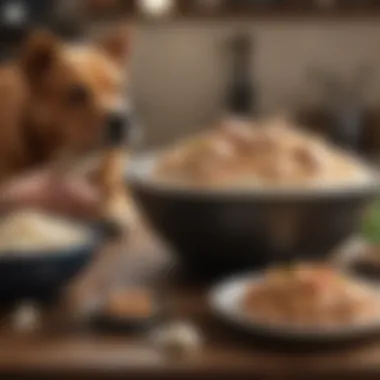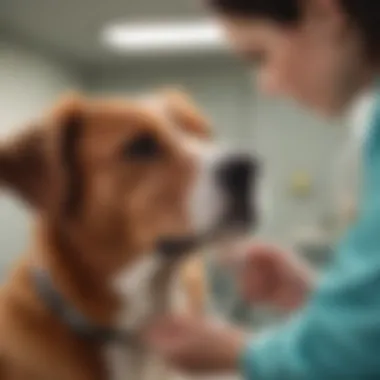Effective Strategies to Cure Dog Diarrhea Quickly


Intro
Dog diarrhea is a condition many pet owners encounter, often leading to frustration and concern. Understanding the causes and effective responses is pivotal in ensuring the well-being of your furry friend. By recognizing symptoms early and intervening appropriately, pet owners can manage this distressing condition more effectively. This article focuses on various strategies to manage and treat dog diarrhea, from dietary changes to recognizing when veterinary assistance is necessary.
Understanding Your Pet
Breed Traits
Different dog breeds may be predisposed to digestive issues due to genetic factors. For instance, certain breeds like the Dachshund or Chihuahua may be more prone to gastrointestinal upset. Recognizing these breed-specific traits can help owners remain vigilant about their dog’s health.
Common Temperaments
Dogs often display unique temperaments that can influence their health. A more anxious dog may experience digestive disturbances due to stress. On the other hand, a curious dog may indulge in inappropriate eating, which can lead to diarrhea. Owners must understand their pet’s behavior for better management of health problems.
Special Needs
Some dogs may have specific dietary needs or intolerances, which increase their risk for diarrhea. For example, a dog with food allergies may react negatively to certain proteins. Consulting with a veterinarian to identify these needs is essential for preventing digestive issues.
Pet Care Essentials
Nutrition and Feeding Guidelines
An effective strategy to prevent diarrhea is ensuring a balanced diet. High-quality dog food tailored to the dog's age, breed, and health status is vital. Owners should avoid rapid changes in diet, as these can upset a dog’s stomach. Gradually transitioning to a new food over a week or more is recommended.
Grooming Tips and Techniques
Regular grooming can play a role in a dog’s overall health, including its digestive system. Keeping a dog clean can prevent the ingestion of harmful particles that may lead to digestive issues. Bathing and brushing should be part of a regular routine to promote good health.
Health and Wellness
Routine veterinary check-ups are crucial. These appointments allow for monitoring of the dog’s general health and early detection of conditions that might lead to diarrhea. Vaccinations and preventative care against parasites are also key aspects of maintaining overall wellness.
Training and Behavior
Basic Training Techniques
Training is not only about teaching commands but also about developing a dog's behavior regarding food. Ensuring that dogs do not scavenge can reduce risks of dietary indiscretion. Basic commands like
Understanding Dog Diarrhea
Understanding dog diarrhea is essential for any dog owner. It is a common condition that often causes concern. Recognizing the underlying causes can lead to effective treatment. When pet owners understand the nature of diarrhea, they are better equipped to respond adequately. They can identify symptoms early and initiate appropriate care. This awareness can potentially prevent dehydration and other complications that arise from untreated diarrhea.
The Basics of Diarrhea
Diarrhea is characterized by loose or watery stools. This condition can be acute, meaning it appears suddenly and lasts for a short time, or chronic, which lasts for more than a few weeks. The dog's digestive system is crucial, as it influences overall health. It is essential to recognize that diarrhea often indicates that the dog's digestive system is reacting to an internal or external trigger. Hence, attending to this problem promptly can avert further health issues.
Common Causes of Dog Diarrhea
Dietary Indiscretion
Dietary indiscretion is one of the most frequent causes of diarrhea in dogs. This term refers to the consumption of inappropriate or spoiled food. Dogs are naturally inquisitive and often eat things that may not be suitable for them. The key characteristic is the sudden onset of diarrhea after consuming something new. This makes dietary indiscretion a relevant topic for this article. Its unique feature is how it may resolve quickly, often within a day, if the offending food is removed. However, it's essential to monitor the dog, as persistent diarrhea could indicate a more serious issue.
Infections and Parasites
Infections and parasites can also trigger diarrhea in dogs. This includes bacterial infections or parasitic infestations like giardia. These causes are significant concerns because they can lead to severe health impacts if left untreated. The primary characteristic of infections and parasites is that they often require veterinary intervention for proper diagnosis and treatment. They are also notable for their capacity to spread between pets, making them a pressing issue amongst pet owners. Understanding these risks is vital in addressing diarrhea effectively.
Food Intolerances and Allergies
Food intolerances and allergies represent another layer of complexity. Some dogs may react negatively to certain ingredients, leading to gastrointestinal upset. It's crucial to note that symptoms like diarrhea may occur days after exposure to the offending food. Food intolerances and allergies can complicate treatment because they often require a dietary overhaul. They highlight the need for vigilance in monitoring the dog's diet. This aspect is essential for identifying and eliminating triggers that can lead to diarrhea.
Underlying Medical Conditions
Underlying medical conditions are another significant factor behind diarrhea. Issues such as pancreatitis, liver disease, or inflammatory bowel disease can manifest as diarrhea. The key characteristic is that these conditions require thorough evaluation by a veterinarian. They are not only a concern for immediate diarrhea but also pose risks for the dog's overall health. Treatment plans often involve diagnosis through tests and careful management under veterinary care. Owners must be aware that diarrhea may not always be a simple problem; it can reflect deeper health concerns.
Recognizing Symptoms of Diarrhea
Understanding the symptoms of diarrhea in dogs is crucial for effective management and treatment. Recognizing these signs allows pet owners to assess the severity and act quickly. Timely identification can be the difference between a minor issue and a serious health crisis. Symptoms can vary widely, but each offers important clues about a dog's condition. Addressing these symptoms quickly can prevent complications.
Types of Diarrhea: Acute vs.


Chronic
Diarrhea in dogs is classified into two types: acute and chronic. Acute diarrhea arises suddenly and often resolves within a few days. It may result from dietary indiscretion or infections. On the other hand, chronic diarrhea persists for weeks or longer, often indicating underlying health issues. Understanding the distinction helps owners take appropriate action.
Additional Signs to Monitor
Monitoring additional signs alongside diarrhea is essential for a comprehensive assessment. Observing these signs can provide further insight into the dog’s health status.
Vomiting
Vomiting commonly accompanies diarrhea in dogs. This symptom can indicate a more serious condition, such as a gastrointestinal blockage or poisoning. The key characteristic of vomiting is its sudden occurrence. It is important because it signals that the dog’s digestive system is distressed. The unique feature of vomiting is that it can lead to dehydrattion, complicating the dog's health issue.
Lethargy
Lethargy presents as a lack of energy or willingness to engage in usual activities. This condition may suggest that the dog is not feeling well. Its key characteristic is a noticeable decrease in alertness or playfulness, which signifies possible underlying problems. Understanding lethargy is beneficial because it often indicates that veterinary attention may be required, especially if combined with diarrhea.
Bleeding in Stool
The presence of blood in a dog's stool is alarming and requires immediate attention. It can result from severe infections or internal injuries. The key characteristic of bleeding is its visible brightness or darkness. This symptom is critical for diagnosis, as it often indicates serious conditions that need urgent care. Observing bleeding in stool prompts immediate veterinary consultation, given its potential seriousness.
Loss of Appetite
Loss of appetite in dogs can indicate a variety of health concerns. This symptom often reflects a dog’s overall discomfort or distress. Its key characteristic is the noticeable unwillingness to eat, which can amplify health risks. Loss of appetite is significant in this context as it can lead to weight loss and further health complications. It’s crucial for owners to be vigilant about this sign, as it often accompanies other symptoms and may require veterinary evaluation.
Recognizing these symptoms early can significantly impact the health and well-being of your dog.
Initial Home Treatment Options
When a dog experiences diarrhea, immediate response can make a significant difference in recovery. Understanding initial home treatment options is important to manage the discomfort and potential health risks that accompany diarrhea. Proper home care can prevent the condition from worsening while also promoting healing. Here are some effective strategies to consider.
Fasting: When and How
Fasting is a common approach for treating diarrhea in dogs. By giving their digestive system a break, the body has a chance to recover. It is generally recommended to fast a dog for 12 to 24 hours, but the exact duration may vary depending on the dog's age, health status, and severity of symptoms. During the fasting period, ensure your dog has access to plenty of fresh water to avoid dehydration.
Important Considerations:
- Age and Health: Younger dogs and those with underlying health issues may need more careful monitoring.
- Duration: A short fasting period is often sufficient. If diarrhea persists beyond 24 hours, seek veterinary advice.
Implementing an Easy-to-Digest Diet
After fasting, providing an easy-to-digest diet helps very much in recovery. This type of food minimizes stress on the digestive system while providing essential nutrients. Alternatives such as boiled chicken with rice or pumpkin mixed with sweet potatoes are popular choices.
Boiled Chicken and Rice
Boiled chicken and rice is a widely recommended dish for dogs with diarrhea. This meal is bland and helps stabilize digestive issues. Key characteristics include:
- Lean Protein: Chicken is a source of high-quality protein that is easy on the stomach.
- Carbohydrates for Energy: Rice provides the necessary energy while being gentle on digestion.
The unique feature of this combination is its simplicity. The easily digestible nature supports recovery without overwhelming the gut. However, it is essential to avoid adding any seasonings or fats, as these can aggravate the condition.
Pumpkin and Sweet Potatoes
Pumpkin and sweet potatoes are also beneficial options in managing diarrhea. These foods offer fiber, which can assist in firming up loose stools. Key characteristics include:
- Rich in Nutrients: Both ingredients are high in vitamins and minerals, contributing to overall health.
- Natural Fiber: Fiber aids in maintaining a healthy digestive system, reducing the likelihood of future issues.
The unique feature lies in the natural properties of both foods. While pumpkin is known for its high water content, sweet potatoes provide additional nutritional benefits. Although both are highly beneficial, always consult with a vet to ensure they are suitable for your specific dog.
Consult a veterinarian before making any major dietary changes, especially if your dog's diarrhea is severe or persistent.
Integrating these home treatment options into your dog's care plan can yield significant benefits. Early intervention often ensures a quicker recovery and a happier, healthier dog.
Homeopathic Remedies for Diarrhea
Homeopathic remedies can offer a gentle approach to addressing dog diarrhea. While traditional treatments often focus on immediate symptom relief, homeopathy aims to support the body's own healing processes. This section will explore both probiotics and herbal remedies, emphasizing their significance in managing diarrhea effectively.
Probiotics: Benefits and Recommendations
Probiotics are live microorganisms that can provide health benefits when administered in adequate amounts. For dogs suffering from diarrhea, probiotics play a critical role in restoring the natural balance of gut flora. An imbalance in gut bacteria can result in gastrointestinal upset, making probiotics an appealing option.


Some notable benefits of probiotics include:
- Restoration of Gut Flora: Probiotics help replenish beneficial bacteria in the digestive tract.
- Improved Digestive Health: They can aid in digestion and nutrient absorption, supporting overall gut health.
- Immune System Boost: Probiotics strengthen the immune system, helping prevent future gastrointestinal issues.
Recommended probiotic products for dogs may include FortiFlora and Proviable. Always consult with a veterinarian before introducing a probiotic to your dog's regimen to ensure the appropriate strain and dosage.
Herbal Remedies to Consider
Certain herbs have shown promise in treating diarrhea in dogs. Here, we will discuss two notable options: slippery elm and chamomile.
Slippery Elm
Slippery elm is known for its soothing properties. It contains mucilage, which can coat the stomach and intestines, creating a protective layer that alleviates irritation. This makes slippery elm a valuable option for dogs experiencing diarrhea.
Key characteristics of slippery elm include:
- Demulcent Nature: It helps to calm and coat the gastrointestinal tract.
- Anti-Inflammatory Properties: It may reduce inflammation in the gut.
One downside to slippery elm is that it may cause slight constipation if used in excessive amounts. It is important to follow dosing recommendations closely or consult a vet before use.
Chamomile
Chamomile is another herbal remedy worth considering. This herb is well-known for its calming effects on both humans and dogs alike. Chamomile can help soothe upset stomachs and reduce anxiety, which is beneficial in the context of diarrhea.
Key characteristics of chamomile include:
- Anti-Inflammatory Effects: It reduces inflammation and discomfort in the gastrointestinal tract.
- Calming Influence: Its mild sedative properties can help manage stress-related digestive issues.
However, chamomile should be used with caution in dogs that are allergic to plants in the same family, such as ragweed or daisies. As with all treatments, it is wise to consult a vet before introducing chamomile to your dog's routine.
When using any homeopathic remedy, remember that each dog is unique. Individual responses can vary, and it is crucial to monitor the dog’s health closely.
In summary, homeopathic remedies like probiotics, slippery elm, and chamomile can provide additional support in managing dog diarrhea. These options could complement traditional treatments, but always involve a veterinarian in the decision-making process.
When to Seek Veterinary Assistance
Understanding when to seek veterinary assistance is crucial for any dog owner dealing with diarrhea. While mild cases can often be resolved at home, there are situations where professional help is needed. Recognizing the difference can be the key to ensuring your dog's health and well-being. This section focuses on critical symptoms, outlining specific indicators that suggest the need for urgent veterinary attention.
Critical Symptoms Indicating Urgency
Persistent Diarrhea
Persistent diarrhea lasts more than a day and signals a serious underlying issue. It may indicate infections, parasites, or even chronic illnesses. This is a key characteristic because ignoring it can lead to worsening health conditions. Prompt assessment can help identify the root cause, be it dietary problems or other serious concerns. The unique feature of persistent diarrhea is its potential to cause dehydration, which can be more harmful to dogs, especially younger or older ones.
- Benefits of Seeking Help: Quick veterinary care can often provide necessary medications or treatments to alleviate diarrhea.
- Disadvantages of Delay: Prolonged diarrhea can lead to nutritional deficiencies and severe health issues.
Severe Dehydration
Severe dehydration is a recognizable condition that results from ongoing diarrhea. Dogs lose fluids rapidly, which can impact organ functions. It is critical to watch for signs like dry gums, lethargy, and sunken eyes. This characteristic makes it essential for swift action, as dehydration can become life-threatening.
- Key Signs: Your dog may not drink water or may vomit after drinking.
- Risk Factors: Puppies and older dogs are at higher risk for dehydration. They cannot tolerate fluid loss as well as healthy adult dogs.
Gastrointestinal Blockage
Gastrointestinal blockage can present alongside diarrhea but might initially appear as a digestive issue. The key aspect is that blockages can prevent normal digestive processes and cause distress. Symptoms like nausea, refusal of food, and abdominal pain are common indicators. Understanding this feature is vital because delay in addressing it can lead to severe complications, including perforation of the intestines.
- Assessment Requirement: A vet can do diagnostic imaging to confirm a blockage and provide necessary treatment.
- Urgency: Blockages can lead to severe health threats in a short time and often require surgical intervention.
It is crucial to trust your instincts. If you feel your dog is unwell, it is better to err on the side of caution and consult your veterinarian.
Veterinary Diagnostic Procedures
When you bring your dog to the vet, several diagnostic procedures may be conducted. These include physical examinations, fecal analysis, blood tests, and imaging tests like X-rays. Each method helps uncover the underlying cause of the diarrhea. Getting a professional opinion can save time and protect your dog's health.
Preventive Measures Going Forward
Preventive measures are essential in ensuring that dogs do not suffer from diarrhea repeatedly. By putting effective strategies into place, pet owners can reduce the chances of their furry friends experiencing this distressing condition. This section discusses the measures that can be adopted to maintain digestive health and overall well-being of dogs.
Establishing a Balanced Diet


A balanced diet is crucial in preventing gastrointestinal issues such as diarrhea. This includes knowing what to feed your dog and how to transition between different diets.
Choosing Quality Dog Food
Choosing quality dog food is a fundamental strategy that impacts a dog’s health significantly. High-quality dog foods are formulated with balanced nutrients that cater to a dog’s specific needs. Quality ingredients help to promote optimal digestion and reduce the possibility of food-related diarrhea.
Key characteristics of quality dog foods include:
- Natural Ingredients: Using real meat, vegetables, and grains
- Nutritional Balance: Ensuring the right proportion of proteins, fats, and carbohydrates
Quality dog food is beneficial. It helps avoid ingredients that may cause food sensitivities or allergies. The unique feature is that such foods have better digestibility, reducing the chances of gastrointestinal upset.
However, it can be more costly than lower-quality brands. It is not always easy to determine what is genuinely quality food just by reading labels. Thus, careful research is necessary.
Gradually Introducing New Foods
Gradually introducing new foods is a vital practice for maintaining digestive health. This approach prevents sudden changes that can disrupt a dog’s digestion.
When a new food is introduced, the key characteristic is to do it slowly over a week or more. Start by mixing a small amount of the new food with the current diet, increasing the proportion gradually.
This method is beneficial because it helps dogs adapt to dietary changes without upsetting their stomachs. The unique feature is that it allows owners to monitor how their dog reacts to each new ingredient. Some dogs may show signs of allergies or intolerances more easily through this gradual approach.
On the downside, it requires patience from the owner. Some may be tempted to rush the process, which could lead to digestive issues.
Regular Veterinary Check-ups
Regular veterinary check-ups should not be overlooked. A veterinarian can identify potential health issues before they escalate into serious conditions. These visits also ensure vaccinations are up to date and that preventative care like flea and tick medications are administered promptly.
Routine checks can catch early signs of dietary sensitivities or infections that could lead to diarrhea.
Maintaining Proper Hygiene
Maintaining proper hygiene is crucial for preventing dog diarrhea. A clean environment minimizes exposure to harmful bacteria and parasites that could affect a dog's digestive system.
Cleaning Up After Your Dog
Cleaning up after your dog is a basic yet vital responsibility that pet owners must not ignore. It helps to reduce the risk of spreading harmful pathogens in the environment.
The key characteristic here is that immediate cleanup of waste minimizes contamination in public areas as well as your home. This practice prevents the spread of infections among pets.
Its unique feature is that it teaches responsibility. By cleaning up, owners contribute to a healthier environment for both their dog and others. While it may require consistent effort, the benefits far outweigh the inconvenience.
Avoiding Contaminated Water Sources
Avoiding contaminated water sources is another preventive strategy. Dogs may drink from standing water or unknown sources, which could lead to illnesses.
The key characteristic is making sure dogs have access to fresh and clean water at all times. This helps avoid potential gastrointestinal infections from contaminated sources.
A unique feature of ensuring clean drinking water is that it promotes overall health and hydration. However, it may be more challenging in certain outdoor situations, like when traveling or hiking. Owners must be vigilant about the water sources their dogs access.
Keeping a dog healthy requires consistent vigilance and proper preventive measures to keep diarrhea at bay. With good practices, the chances of gastrointestinal upset can be significantly reduced.
Understanding Dietary Influences
Diet plays a crucial role in the health of dogs, directly impacting their well-being and digestive systems. Understanding dietary influences can help dog owners mitigate issues like diarrhea and ensure their pets thrive. This section delves into why dietary considerations are vital for pet health, factors affecting digestion, and the need for proper nutrition.
A well-balanced diet is essential for maintaining gut health. Dogs that consume a variety of nutritious foods are less likely to experience gastrointestinal disturbances. Every dog is unique, meaning their dietary requirements can differ based on age, breed, size, and health status. Properly assessing these needs is the first step toward preventing dietary-related issues.
Additionally, being aware of how certain foods affect a dog's digestive system can help in recognizing potential triggers. Some dogs may react negatively to specific ingredients, leading to diarrhea or other health problems. Therefore, understanding dietary influences is not merely beneficial but vital for caring pet owners.
Recognizing Food Sensitivities
Food sensitivities emerge when a dog's immune system reacts to specific food components. Identifying these sensitivities can be challenging, as symptoms may vary widely. Common food culprits include:
- Grains: Some dogs are intolerant to wheat or corn.
- Dairy: Lactose intolerance is not uncommon in canines, potentially resulting in diarrhea.
- Proteins: Beef and chicken are frequent allergens, and some dogs may react negatively.
- Additives: Artificial preservatives and colorings can trigger digestive upset.
Recognizing these sensitivities is essential. Keep a food diary to track your dog's diet, noting any adverse reactions. If diarrhea persists after dietary adjustments, consulting with a veterinarian is advisable.
Assessing Nutritional Needs
Assessing a dog's nutritional needs involves evaluating several factors to ensure a diet supporting overall health. Consider the following aspects:
- Life Stage: Puppies, adults, and senior dogs have differing nutritional requirements, necessitating tailored diets.
- Activity Level: Active dogs may need more calories and specific nutrients compared to less active ones.
- Health Conditions: Pre-existing health issues like allergies, diabetes, or obesity require special attention in dietary choices.
- Quality of Ingredients: Look for high-quality dog food that lists proteins as the primary ingredient, avoiding grains if there’s a sensitivity.
By recognizing food sensitivities and assessing nutritional needs, dog owners can craft a customized diet that promotes digestive health. This proactive approach can minimize the likelihood of diarrhea and enhance the overall quality of life for their furry companions.



